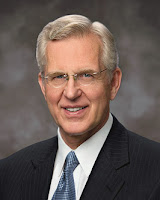Hi Samuel, for the longest time I have wanted to thank you for your Hope Works message on unity among faiths. It's a message I've also been sharing for quite a while and I was so delighted to find your video. It's refreshing to hear another witness of this important message. Here are two posts I wrote this year of a similar message. Thanks for sharing the thoughts of your heart!
https://allstandtall.blogspot.com/2017/06/the-power-of-open-mind.html?m=1
https://allstandtall.blogspot.com/2017/08/unity-among-churches-part-of
Samuel replied back and shared with me his most recent article that is similar to the message of his Hope Works video. It's titled, "What is Truth?"
I very much enjoyed this article and wanted to pass it along to you. It's awesome to see that the Church shares and supports a message that is so important in this day and age that we live in. My favorite quote from the article is highlighted in yellow. Hope you enjoy!
“What is truth?”
Pilate’s question to Jesus before His death never loses relevance. Though we do not all agree on what truth is or where to find it, the search for it cannot be avoided.
But today truth seems to have fallen on hard times. We live in what many are calling a post-truth age. Oxford Dictionaries selected this as its 2016 word of the year, defined as circumstances in which “objective facts are less influential in shaping public opinion than appeals to emotion and personal belief.” The endless loops of memes, opinions and aspersions spread mistrust through social media and require more effort to discern fact from fiction. People seek answers that only confirm their existing biases. Partisans in ideological combat pursue victory over truth.
Despite this confusion, the truth of things is not something we’re wired to ignore. Aristotle was right — “All men desire by nature to know.” But if there were no truth there would be nothing to know. Our reasoning faculties would forever spin. There must be a solid foundation.
 |
| Joseph Smith |
 |
| D. Todd Christofferson |
 |
| Hugh B. Brown |
Indeed, as one Mormon scripture teaches, God “will yet reveal many great and important things.”
 |
| B. H. Roberts |
In that spirit, the First Presidency made the following statement in 1978: “The great religious leaders of the world such as Mohammed, Confucius, and the Reformers, as well as philosophers including Socrates, Plato, and others, received a portion of God's light. Moral truths were given to them by God to enlighten whole nations and to bring a higher level of understanding to individuals.”
So, according to Roberts, “God raises up wise men and prophets here and there among all the children of men, of their own tongue and nationality, speaking to them through means that they can comprehend.” Thus, he continues, “wherever God finds a soul sufficiently enlightened and pure; one with whom his Spirit can communicate, lo! he makes of him a teacher of men.”
Because truth is scattered among all nations and peoples, Mormons believe in learning “out of the best books” of things that “have been, things which are, things which must shortly come to pass; things which are at home, things which are abroad; the wars and perplexities of the nations, … and a knowledge also of countries and of kingdoms.” Such knowledge helps Latter-day Saints be not only better citizens and neighbors but also better Mormons.
An expansive vision of truth can bring more depth, clarity and love into our lives and make us more willing to listen, more able to understand and more inclined to build up rather than tear down.
All of Samuel Hislop's work including the above article can be found here: https://samuelhislop.com/writing/


No comments:
Post a Comment